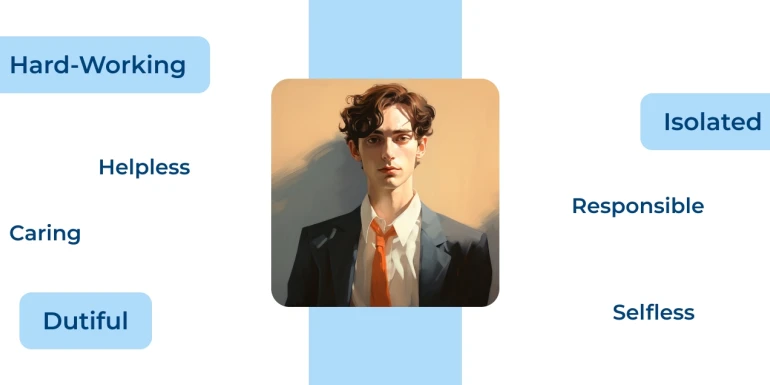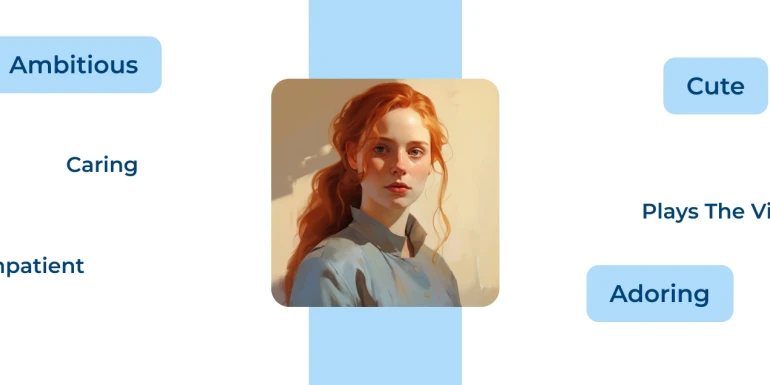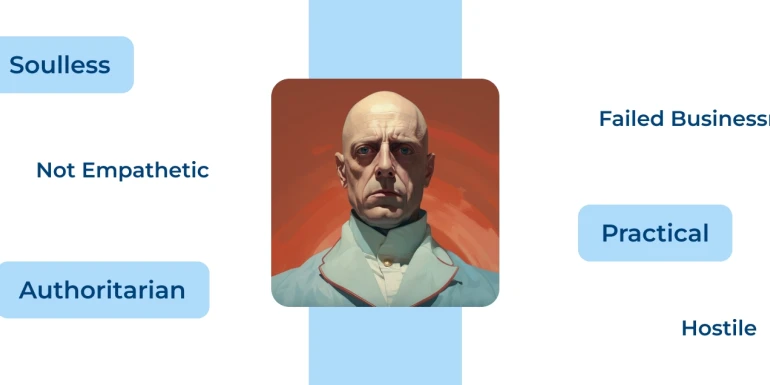by Franz Kafka


The Metamorphosis: Characters
Table of contents
- Gregor Samsa
- Grete Samsa
- The Father
- The Mother
- The Charwoman
- The Office Manager
- The Boarders
- The Maid
Gregor Samsa

Gregor Samsa is the central character of Franz Kafka's novella, The Metamorphosis. The story revolves around Gregor, a hardworking salesman, who wakes up one morning to find himself transformed into a giant insect-like creature. Throughout the novella, Gregor's character goes through a significant transformation, both physically and emotionally. Here is an analysis of Gregor Samsa's character in The Metamorphosis.
At the beginning of the story, Gregor is presented as a dutiful son and an industrious worker. He wakes up early every morning to go to work and support his family financially. Despite his tedious job as a traveling salesman, he does not complain and takes pride in his ability to provide for his family. He is a responsible and dependable person who always tries to meet the expectations of his family and employer. Gregor's transformation into an insect can be seen as a metaphor for the way society perceives and treats him. Just as an insect is often regarded as a nuisance and is swiftly dealt with, Gregor's family sees him as a burden and eventually tries to get rid of him.
As the story progresses, Gregor's physical transformation is accompanied by a mental and emotional one. He becomes increasingly isolated from his family and society, and his sense of identity is completely shattered. His ability to communicate with others is also hindered by his insect-like features, and he struggles to express his thoughts and emotions. Despite his desire to maintain a connection with his family, Gregor is constantly rejected and eventually becomes a mere object of disgust and shame.
One of the most significant aspects of Gregor's character is his unwavering sense of duty and obligation. Despite being physically and emotionally drained, he continues to work and support his family. Even after his transformation, he tries to make his way to work, but his insect-like features make it impossible. This sense of duty and responsibility ultimately leads to Gregor's downfall, as his family exploits him for financial gain and abandons him when he is no longer able to provide for them.
Gregor's character can also be seen as a representation of the human condition. His transformation into an insect-like creature highlights the fragility of human existence and the arbitrary nature of societal norms and expectations. Gregor's struggle to maintain a sense of self and identity in the face of overwhelming adversity is something that many people can relate to. His inability to communicate effectively with others and the resulting sense of isolation and loneliness are also universal themes that resonate with readers.
In conclusion, Gregor Samsa's character in The Metamorphosis is a complex and multifaceted one. His transformation into an insect-like creature is a powerful metaphor for the way society treats and perceives those who do not conform to its standards. Gregor's unwavering sense of duty and obligation, despite his physical and emotional suffering, is a testament to his strength of character. The novella serves as a powerful commentary on the human condition and the struggle to maintain a sense of self and identity in the face of overwhelming adversity.
Grete Samsa

Grete Samsa is one of the main characters in The Metamorphosis. She is a young woman and the sister of the protagonist, Gregor Samsa. Her character undergoes a significant transformation throughout the story, which reflects the overall theme of transformation and alienation.
At the beginning of the story, Grete is depicted as a caring and responsible young woman. She is the only member of the Samsa family who shows some degree of concern and empathy towards Gregor after his transformation. She brings him food, cleans his room, and tries to make him as comfortable as possible in his new form. However, as the story progresses, Grete's attitude towards Gregor starts to change.
As Gregor's transformation becomes more apparent, Grete begins to distance herself from him. She becomes increasingly annoyed by his presence and stops bringing him food. She even starts to remove furniture from his room, which makes his already difficult living conditions even worse. This change in Grete's behavior towards Gregor reflects the alienation and isolation that Gregor experiences from society after his transformation.
As the family's financial situation worsens and their hope of ever reverting Gregor back to his human form fades away, Grete undergoes another transformation. She starts to work and assumes a more active role in the family's affairs. Her responsibilities at work start to weigh down on her, and she becomes more irritable and short-tempered. She resents Gregor for his condition, which she sees as a burden on the family's finances and her personal life. She even goes as far as suggesting that the family would be better off without him.
In the story's final scenes, Grete reaches her breaking point. She confronts Gregor and berates him for being a monster and ruining their lives. Gregor's death follows shortly after, and Grete's transformation reaches its peak. She becomes a woman who has lost all empathy and compassion. She is relieved by Gregor's death and shows no remorse or sadness. Her character's development from a loving and caring sister to an emotionless and cold individual reinforces the story's themes of transformation, isolation, and dehumanization.
In conclusion, Grete Samsa's character in "The Metamorphosis" undergoes a significant transformation that reflects the novella's overall themes. Her character's development from a caring and responsible young woman to an emotionless and cold individual is a result of her family's financial struggles and her inability to cope with Gregor's transformation. Grete's transformation serves as a reminder of the impact that isolation and alienation can have on a person's character and morality.
The Father

Mr. Samsa, the father of Gregor Samsa in Franz Kafka's "The Metamorphosis," is a complex character. He is portrayed as a strict, unsympathetic, and distant man who does not hesitate to physically abuse his son. However, as the story progresses, his character becomes more nuanced, and the reader begins to understand the root of his behavior.
Initially, Mr. Samsa is depicted as a patriarchal figure who has a domineering presence in the household. He is described as having a "heavy chin" and "bald temples," which conveys a sense of authority and dominance. He is also a symbol of the traditional, bourgeois family structure, where the father is the breadwinner, and the children are expected to obey and respect him.
However, his behavior towards Gregor is often cruel and abusive. He throws apples at Gregor, inflicting physical pain, and on one occasion, he even violently shoves him back into his room. He also frequently expresses his disappointment and frustration with Gregor's inability to work and provide for the family.
As the story progresses, it becomes clear that Mr. Samsa's behavior is a result of his own sense of failure and helplessness. He is unable to provide for his family on his own and is dependent on Gregor's income to maintain their lifestyle. When Gregor is no longer able to work, Mr. Samsa becomes increasingly desperate and stressed, leading him to lash out at his son.
However, it is also clear that Mr. Samsa cares deeply for his son, despite his harsh treatment of him. He is visibly distressed when Gregor's condition worsens, and he is willing to do whatever it takes to protect his family's reputation, even if it means getting rid of Gregor.
In the final scenes of the story, Mr. Samsa's character undergoes a significant transformation. He becomes more vulnerable and human, revealing his own inner struggles and insecurities. When he sees Gregor's corpse, he is overcome with emotion, and it is clear that he is mourning not just the loss of his son but also the loss of his own identity as a patriarch and provider.
In conclusion, Mr. Samsa is a complex and multifaceted character in "The Metamorphosis." While he initially appears as a strict and abusive father, his behavior is later revealed to be a result of his own sense of failure and desperation. Despite his harsh treatment of Gregor, it is clear that he cares deeply for his son and is willing to make sacrifices to protect his family. His character ultimately undergoes a transformation, revealing his own inner struggles and vulnerabilities.
The Mother
Gregor Samsa's mother is a complex character in Franz Kafka's novella, The Metamorphosis. While she initially appears to be a loving and caring mother, as the story progresses, her behavior towards Gregor changes drastically.
At the beginning of the story, Gregor's mother is shown to be a caring and doting mother. She is the first one to enter his room after his transformation and tries to feed him. She is also very concerned about his well-being and always tries to make sure that he is comfortable. When Gregor is unable to get out of bed, she often comes to his room to check on him and make sure that he is not in any discomfort. However, as the story progresses, her behavior towards Gregor changes.
As Gregor's condition worsens, his mother becomes increasingly distressed and worried. She becomes more concerned about his appearance and how he is affecting the family's reputation rather than his well-being. She becomes less empathetic and more resentful towards him, and as a result, she starts to avoid him. She is often seen crying or in a state of distress, but she is unable to come to terms with her son's transformation.
Gregor's mother is also heavily influenced by her husband's opinions and views. She is often seen deferring to him and agreeing with his decisions. When Gregor's father insists that they get rid of Gregor, she initially resists but eventually gives in to his demands. Her inability to stand up for her son shows her lack of agency and her dependence on her husband.
In many ways, Gregor's mother is a victim of the patriarchal society that she lives in. She is expected to be subservient to her husband and follow his lead, even if it means going against her maternal instincts. She is also a victim of the family's financial situation, as she is forced to take in lodgers to make ends meet. This puts a strain on her relationship with her son, as she becomes more focused on the financial benefits of having lodgers than on her family's well-being.
Overall, Gregor's mother is a complex and conflicted character in The Metamorphosis. While she initially appears to be a caring and loving mother, her behavior towards Gregor changes as the story progresses. She becomes more concerned about her family's reputation and financial situation, and as a result, she becomes less empathetic towards Gregor. Her dependence on her husband and the patriarchal society she lives in also contribute to her inability to stand up for her son.
The Charwoman
The Charwoman is a minor character in Franz Kafka's "The Metamorphosis," but she plays an important role in the story's plot. She is introduced in Part Two of the story as a housekeeper who cleans the Samsa family's apartment. After Gregor Samsa transforms into a giant insect, the charwoman is one of the few people who can tolerate being in his presence, and she is the one who discovers his body after he dies.
The charwoman's character is portrayed as practical, efficient, and unemotional. She is not shocked by Gregor's transformation, and instead, she immediately starts cleaning his room and removing his body from the apartment. This shows her ability to remain calm and composed in the face of a bizarre and unsettling situation.
Furthermore, the charwoman's character is also used as a contrast to the behavior of the Samsa family, who are unable to accept Gregor's transformation and treat him with disgust and fear. The charwoman's indifference to Gregor's appearance highlights the Samsa family's inability to see beyond his physical changes.
Overall, the charwoman's character represents a practical and efficient approach to life, and her role in the story serves to emphasize the dysfunctional nature of the Samsa family.
The Office Manager
The Office Manager is a minor character in The Metamorphosis, but he serves as a contrast to the Samsa family's lack of compassion towards Gregor. The manager is polite and concerned about Gregor's absence from work, whereas the Samsas quickly become frustrated with their son's transformation and are more concerned about how it affects their own lives.
The Office Manager is also an embodiment of the dehumanizing nature of modern capitalism. He is solely concerned with the productivity and efficiency of his workers and does not show any concern for their personal well-being. He sees Gregor only as a means to an end and is willing to use any means necessary to ensure that he continues to work, even if it means breaking into the Samsa's apartment.
Overall, the Office Manager represents the societal pressures and expectations that individuals face in a capitalist society, where personal value is often measured by one's ability to produce and contribute to the economy. His indifference towards Gregor's condition highlights the inhumanity of such a system, which can often overlook the individual's well-being in pursuit of profit and productivity.
The Boarders
The boarders in Franz Kafka's "The Metamorphosis" are minor characters who play a significant role in highlighting the changes in the Samsa family's dynamics after Gregor's transformation. They are described as three men who rent a room from the Samsas, and their behavior towards Gregor's family changes after his transformation.
Initially, the boarders are portrayed as friendly and respectful towards the Samsas, often praising their cooking and cleaning skills. However, after Gregor's transformation, they become more demanding and critical. They refuse to pay rent because they are dissatisfied with the cleanliness of the apartment and demand to see Mr. Samsa to voice their complaints.
The boarders' behavior can be seen as a reflection of society's tendency to ostracize those who are different or non-conforming. As Gregor's physical appearance changes, the boarders' attitude towards the Samsa family also changes. They no longer see the Samsas as respectable individuals, but instead view them as a burden and a source of inconvenience.
Overall, the boarders represent the callousness and indifference of society towards those who do not conform to societal norms, making them important minor characters in the novel.
The Maid
The maid in "The Metamorphosis" is a minor character, but her presence plays an important role in the story. She is introduced in the second part of the story as a new servant hired by the Samsa family to replace the old maid. The maid is described as a young and inexperienced girl who is scared of Gregor's transformation and does not want to enter his room.
Although she does not have a significant impact on the plot, the maid's character adds to the overall atmosphere of the story. She represents the general reaction of society to those who are different or deviant. Her fear of Gregor's transformation reflects the fear and disgust that society often has towards those who are considered abnormal or different. The maid's inability to face Gregor also highlights the isolation and loneliness that Gregor experiences in his transformed state.
Overall, the maid's character serves as a reflection of society's reaction to those who are different, and her fear and avoidance of Gregor adds to the overall sense of alienation and detachment in the story.

- Instructions Followed To The Letter
- Deadlines Met At Every Stage
- Unique And Plagiarism Free


 The Great Gatsby
The Great Gatsby
 The Things They Carried
The Things They Carried
 Frankenstein
Frankenstein